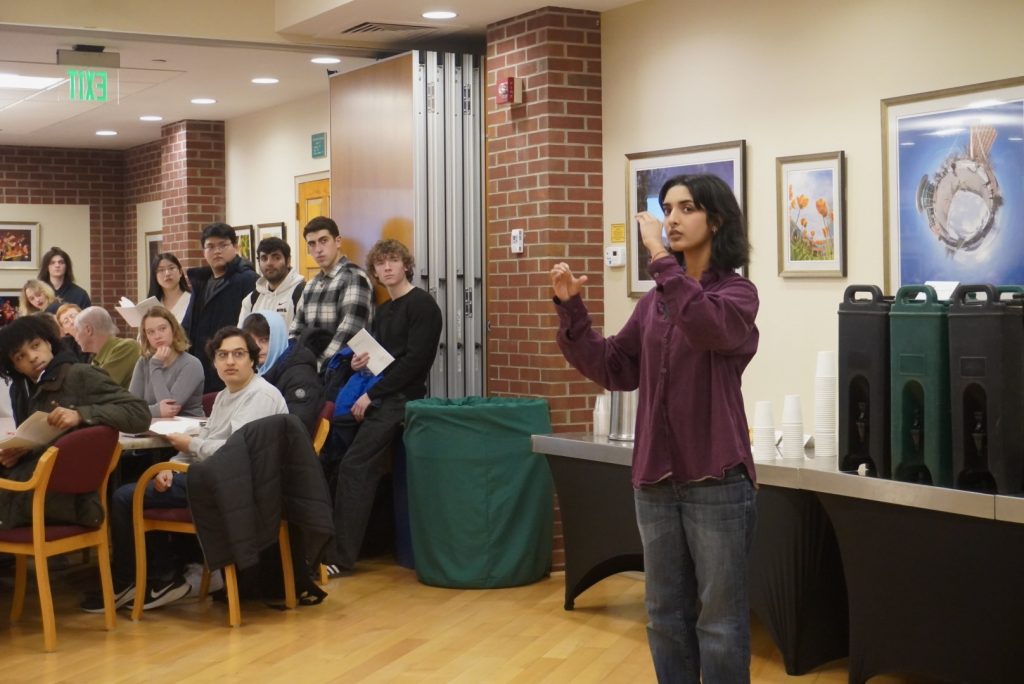Carl Gelderloos, an associate professor of German and the director of undergraduate studies for German, hosted “Languages of Love: A Languages Poetry Evening” this Thursday. It aimed to highlight the value Binghamton University places on its language departments.
Funded by the Departments of Asian and Asian American Studies, German and Russian Studies, Judaic Studies, Middle Eastern and Ancient Mediterranean Studies and Romance Languages and Literatures, the event, held in the reception hall of the Anderson Center, saw an amazing turnout.
Eighteen poems were read by students in various languages, including Arabic, American Sign Language, Chinese, French, German, Ancient Greek, Hebrew, Italian, Japanese, Korean, Latin, Persian, Russian, Spanish, Turkish and Yiddish.
In his speech, Gelderloos said he wants to make this an annual event and hopes it will feel less like a performance and more akin to a jazz cafe atmosphere, where attendees can mingle while listening to the readings. He further mentioned that there seems to be a desire in the community to make these types of events more commonplace.
This event showcased the intellect of BU students and the importance of languages. Having over 10 languages in its course catalog, all languages taught were represented in this event. Gelderloos mentioned his appreciation for poetry because love and language can be expressed through words. He finalized his speech with a short yet impactful line: Life is short, art is long.
Sara Elzourkany, a senior double-majoring in psychology and Arabic studies, kicked off the event by reading a poem in Arabic titled “Say I Love You.”
“As someone who is Arab myself, I originally began taking Arabic language classes to strengthen my native tongue,” Elzourkany wrote in an email. “However, the more I learned about the mechanics of the language, the more I was entranced and amazed. As my understanding increased, I got more into Arabic poetry, reading literary legends like Nizar Qabbani and Mahmoud Darwish. I always knew Arabic was an expressive language, but seeing these tales of love, loss, and culture being woven by the threads of my homelands spoke to my soul — more than any English poetry ever could.”
Following Elzourkany was a poem performed in American Sign Language. The room became silent, and attendees immersed themselves in the story. It was performed by Kajol Kundra, a junior majoring in linguistics who was enticed by the event because of her belief that ASL is an art form that is underappreciated and deserves to be seen.
“There is such a strong culture connected to ASL and I am glad I will be some form of ASL exposure to my peers,” Kundra wrote in an email. “ASL’s form of poetry is very different from any spoken language because it is displayed through deep expressions and performance.”
After came poems read in Chinese, French, German, Greek, Hebrew. Each student performed their piece with confidence and eloquence, and the audience listened with rapt interest as each language was presented. As students performed, the audience was free to roam, get refreshments and appreciate the art around them.
“Participating in this event means sharing that deep love and connection with others, showing them just how beautiful and essential this art form is,” Elzourkany wrote. “And although understanding the language is part of the full experience, just hearing a traditional recitation alongside an English translation is more than enough to strike a cord within my audience — because poetry is felt, not merely read.”



